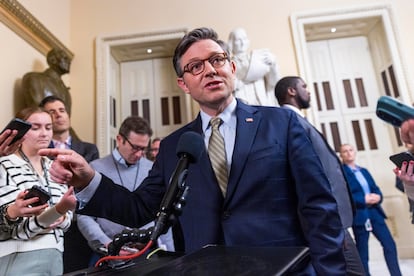The live nerves, the knives, the usual congressmen looking for the spotlight, the reporters running through the narrow corridors, the last minute commitments and the more or less happy ending… Almost nothing of what happened on Friday in the Capitol, a A frenetic day that ended with the approval of a temporary financing law to avoid a government shutdown, was a surprise for veteran spectators of Washington’s great theater. And yet, the negotiations between both parties to avoid the public spending tap being cut off at midnight – and, for example, the salaries of some 875,000 civil servants not being paid at Christmas – offered valuable clues about the difficulties that await Donald Trump and his Government of billionaires to carry out their agenda in a hurry with a Congress in front of which the Republicans barely dominate.
It also served as a test for the enormous political influence that Elon Musk, the richest man on the planet, seems to have for at least the next four years, and as long as he retains his position as president. Trump’s Friend in Chief. The tycoon alone, with his expensive toy, the social network He did it through tweets, about 150, and threats like this: “Any member of the House or Senate who votes in favor of this scandalous spending bill deserves to be expelled.” [en las próximas elecciones] in two years!”
Not only did it cause a true legislative nightmare before Christmas and ruin the quiet week that Democrats and Republicans had designed to say goodbye to the year in time to return home on Thursday, as they usually do; Musk also inaugurated an era in the relationship, not exactly new, between oligarchy and political power in a country in which wealth is usually virtuous in principle. With obvious haste to start governing – the cliché would say that in the shadows, if it were not for the fact that he does everything in full view of his more than 200 million followers -, the businessman pushed the third authority in the country, the president of the House of Representatives Mike Johnson, on the verge of the abyss and managed to make him dance to the rhythm of his music until Trump, who ended up scalded.
The president-elect has entrusted the magnate with the shared leadership of the Department of Government Efficiency. In what could be interpreted as the first task of a job that in theory does not begin until the inauguration on January 20, Musk decided that the agreed law was another outrageous expression of what is going wrong in Washington, so he forced a review …and then another. And all this, while the billionaire showed his support for the far-right party Alternative for Germany (AfD, for its acronym in German) in the next elections and raised doubts about whether the success of his investment of more than 260 million dollars (250 million of euros) in the campaign that brought Trump to the White House will not be the first step in a plan for world domination (and right-wing).
The reduced text was finally supported by 366 of the 435 congressmen, and received 34 votes against, all Republicans. The Senate approved it late Friday and President Joe Biden signed it on Saturday. It includes, in addition to the Government’s financing guarantee only until March 14 (the day on which a new installment of this recurring drama is expected in Washington), the updating of a law to combat poverty and encourage agriculture and a $110 billion in subsidies to farmers and aid to victims of natural disasters that regularly hit the country.
Along the way, there were measures to reduce the cost of medicines, money to promote medical research and limits on investments in China. Also, in what was a disappointment for Trump, his express request to take advantage of the opportunity to increase or abolish the debt ceiling had to be sacrificed. In a previous vote, the unthinkable had happened: 38 Republican congressmen, apparently more fanatical about cutting public spending than he, voted against a pact supported by the president-elect, who, yes, has the party at his feet, but is a ideologically divided party when the issue is public spending.
Money to keep promises
In a wish that may seem paradoxical for someone who campaigned promising to slim down the Government, the president-elect wants to end that spending limit no matter what. He needs it to carry out two of his main promises: the mass deportation of irregular migrants and tax cuts. Extending that ceiling until 2027 is a debate that corresponds to the new Congress, which will be constituted on January 3, but, as with everything else, Trump, who has been governing for weeks, with Biden half missing, was in a hurry. At the same time that he is sworn in, he will do so with an expiration date; The law, unless it changes it, does not allow him to run again in 2028.

What we have seen this week also indicates once again that there is an insurmountable discrepancy in the elastic way in which the president-elect and reality itself interpret reality. He clearly won at the polls, in the electoral vote and in the seven decisive states, but it was not the overwhelming victory that he proclaimed on the same election night, long before the end of the vote count. And it was not, especially, in the House of Representatives, where the Republicans have gone from having 222 seats to 220 (compared to 215 for the Democrats).
Trump said in an interview with timein the issue that crowned him for the second time as “Person of the Year”, which considers that he has received “an enormous mandate” from the American people. Theirs control both chambers, but with those margins, and in a country that, as has been proven again in recent days, does not know anything resembling party discipline, smooth governance is not guaranteed.
Trump’s first big test, which is above all a test of Johnson’s leadership, is just around the corner. On January 3, the House of Representatives votes to elect its speaker and the ultra-conservative congressman from Louisiana needs all the votes. One of them, Thomas Massie, a libertarian from Kentucky, has already told him not to count on it. Two years ago, it took 15 rounds of voting and a good handful of concessions to the hardline of Trumpism to elect his predecessor, Kevin McCarthy. Totally, so that, after going through such humiliation, he would only last 10 months in the position, from which he was evicted through a motion of confidence.
On Friday night, Johnson appeared before Capitol reporters after saving the furniture, unable to contain a giggle of relief. He was proud of having approved “America First” legislation and, in further proof of how quickly the extraordinary is normalized in Trump’s United States, he admitted without embarrassment that less than an hour ago he had spoken with Musk about the challenges of his job. “I have asked him [al empresario]: ‘Do you want to be president of the House?’” he said. “I don’t know,” he replied, adding that this could be the most difficult job in the world. And I think it is.”
Chaos and legislative paralysis have defined Johnson’s time leading Republicans in the House. It is hard to believe that the arrival of Trump, an unpredictable politician who left office instigating an insurrection and now returns in a hurry, is going to change that, added to the disruptive element of Musk, who recently showed up to meet with conservative senators with his four-year-old son. on shoulders In the spectacle society of American politics, The Capitol has been populated in recent years with extravagant characters whose egos fuel social networks and their participation in the endless news cycle of cable television networks. Many of them are Republicans, and many came to Washington with the mission of containing public debt, which has skyrocketed in the last decade, and especially since the pandemic. These personalities do not guarantee a calm legislature either, although this time the president arrives with support, at the polls and within his own party, much greater than what he had in 2016.
The scuffles with Congress were constant in his first round in the White House. The most notorious led in 2018 to the longest government shutdown in history. It was when the legislators did not want to support him in his efforts to build the wall with Mexico. It lasted 35 days, and ended with the declaration of a national emergency so that the president could finance it through other means. Trump is still obsessed with the wall, although the cost of that project pales in comparison to his star promise in immigration matters: the mass deportation of undocumented immigrants, whose bill is not quantified, but could amount to tens of billions of dollars. To pay that bill he will need the support of Capitol Hill and a Republican Party whose obsession with the border may only surpass its fixation on containing public spending.









